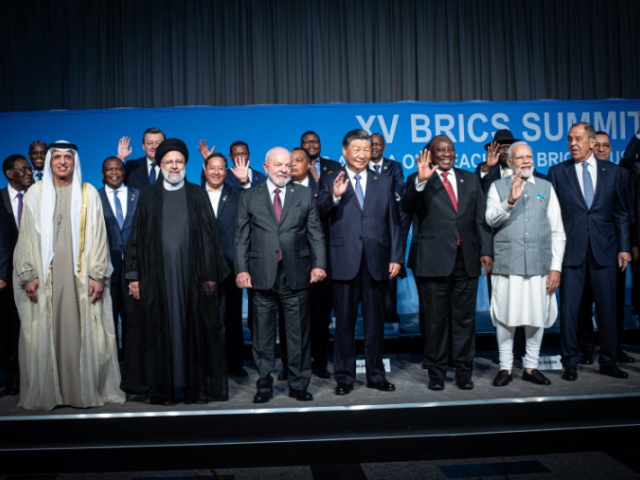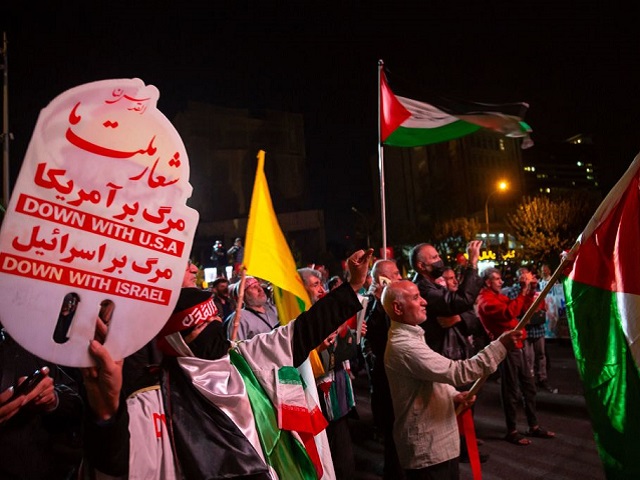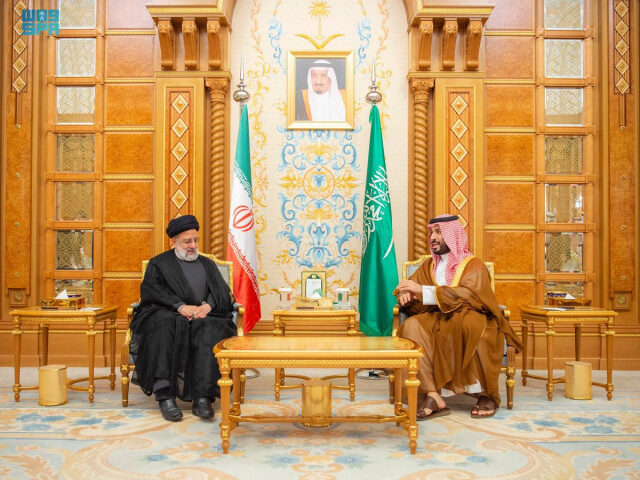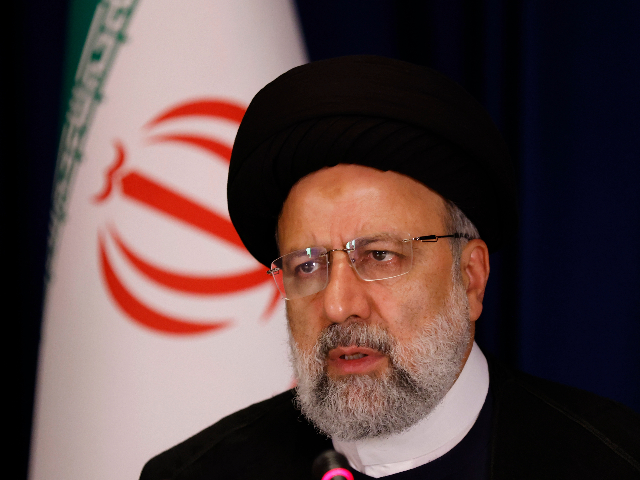Iranian President Ebrahim Raisi visited Riyadh, Saudi Arabia, this weekend for a meeting of 57 Muslim world leaders to condemn Israel in response to its ongoing self-defense operation against the genocidal Hamas terrorist organization.
Raisi’s visit to Saudi Arabia was his first since assuming the office of the presidency – which is subordinate to “supreme leader” Ayatollah Ali Khamenei – and included an in-person meeting with the de-facto leader of the country, Crown Prince Mohammed bin Salman. It was his first such engagement since Saudi Arabia and Iran restored diplomatic ties in March as a result of talks between the two countries in Beijing, China. China welcomed both countries to its BRICS coalition – which also includes Brazil, Russia, India, and South Africa – shortly after they formally mended the bilateral relationship.

South African President Cyril Ramaphosa and fellow BRICS leaders pose for a family photo with new members at the last day of the BRICS summit. New Members are Argentina, Egypt, Ethiopia, Iran, the U.A.E., and Saudi Arabia (Photo by Per-Anders Pettersson/Getty Images).
Saudi Arabia’s state-run Saudi Press Agency (SPA) published an image of bin Salman meeting with Raisi on the sidelines of this weekend’s meeting, which brought together the members of the “Organization for Islamic Cooperation” (OIC) to condemn Israel:
سمو #ولي_العهد يلتقي رئيس الجمهورية الإسلامية الإيرانية وذلك على هامش انعقاد #القمة_العربية_الإسلامية_المشتركة غير العادية.#قمة_عربية_إسلامية_بالسعودية | #واس pic.twitter.com/IFzEHvxXKn
— واس الأخبار الملكية (@spagov) November 11, 2023
Prior to the in-person meeting, bin Salman and Raisi held their first phone call in October, also to discuss Israeli self-defense operations. Neither the call nor the meeting in Riyadh resulted in a joint statement or any material coordination between Iran and Saudi Arabia.
The Saudi government had reportedly planned to convene a meeting of the smaller Arab League to address Israel’s operations to protect its people against Hamas but extended the invite to all members of the OIC, which include non-Arab nations such as Iran and Turkey.
The OIC event formally ended on Monday but featured speeches by heads of state on Saturday. Raisi used his address to condemn the United States and demand that all Muslim countries establish a trade embargo on Israel, a demand the state parties to the meeting already maintaining ties to Israel, such as the United Arab Emirates (UAE) and Bahrain, ignored.
The embargo demand was one of ten actionable items that Raisi proposed in his speech, as detailed in Iran’s PressTV propaganda outlet, which also included declaring the Israeli military a terrorist organization and “the establishment of an international court to punish Israeli crimes.”
Other points also included pressuring Egypt to conduct an “immediate and unconditional reopening” of its Rafah border crossing with Gaza – a nonstarter for the government of Egyptian President Abdel Fattah al-Sisi, which has enthusiastically rejected accepting Palestinian refugees – and declaring the date of the bombing of Gaza’s Al-Ahli Hospital a “day of genocide” to condemn Israel. Israel did not target the hospital; the institution was bombed by a rocket shot by the Palestinian Islamic Jihad (PIJ) jihadist terror group, which Iran funds.
Elsewhere in his speech, according to PressTV’s translation, Raisi used his remarks to condemn the United States, which he claimed had “the most destructive role” in the conflict between Israel and jihadist terrorist organizations and railed against American military operations in Afghanistan, Iraq, and other Muslim nations. He claimed the nation of Israel was “the illegitimate child of the United States.”
No reports on Raisi’s remarks indicated that he mentioned Hamas in his remarks. Israel’s current operations in Gaza are meant to neutralize Hamas and are a direct response to the terrorist organization’s massacre of 1,200 people on October 7 in a sprawling attack on random people in Israel, which it proudly branded the “al-Aqsa flood.” Hamas terrorists infiltrated Israel on that day and went door-to-door killing entire families in residential communities and leaving upwards of 250 people dead at a music festival. Forensic evidence suggests Hamas terrorists engaged in gang rapes, extensive torture, and killed their victims, including babies, in gruesome ways. Hamas also took about 250 people hostage, including at least one American toddler.
The government of Iran celebrated the mass killing on the night of October 7 by staging a massive street party, featuring free sweets and fireworks, in Tehran. The Saudi government did not openly celebrate the attack but failed to condemn Hamas in the aftermath of the terror.

Supporters of the Iranian regime demonstrate, holding pictures of Qasem Soleimani, and display a banner stating ‘Down with USA and Israel’ as they celebrate the Hamas attack on Israel (HOSSEIN BERIS/Middle East Images/AFP via Getty Images).
The OIC conference ended with the nations publishing a joint statement that also failed to mention Hamas, as translated in summaries published by the governments of Oman and Saudi Arabia. The statement enthusiastically condemned acknowledging that Israeli military operations following October 7 were intended to protect the Israeli population from terrorism and called for the creation of a state of “Palestine” carved out of Israel.
Among the provisions of the statement were to “reject describing this retaliatory war as self-defense or justifying it under any pretext,” to “denounce settler terrorism,” and to place alleged “settler” groups on “global terrorism lists.” The statement additionally demanded the International Criminal Court investigate alleged “war crimes and crimes against humanity committed by Israel.”
The independent outlet Iran International observed that Raisi’s ten action items did not make it into the joint statement, particularly calls to end diplomatic ties with Israel for OIC nations that maintain them and a call for the elimination of Israel in its entirety. The urging of Israel to accept a “two-state solution” in the OIC text directly rejected Iran’s demands.
The Iranian Foreign Ministry expressed “reservations” about the final statement on Monday.
“The resolution approved during the Organization of Islamic Cooperation (OIC) meeting in Riyadh, despite having a strong text, has several provisions about which the Islamic Republic of Iran has always expressed reservations in the past,” Ministry spokesman Nasser Kanaani reportedly said, citing “the two-state solution, 1967 borders, and Arab peace plan.”


COMMENTS
Please let us know if you're having issues with commenting.